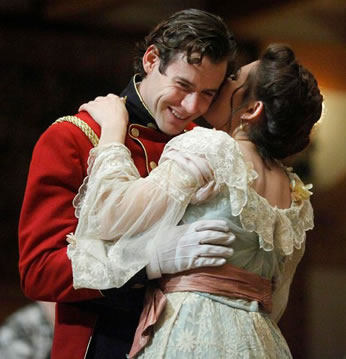Much Ado About Nothing
Much Ado about Something
American Shakespeare Center, Blackfriars Playhouse, Staunton, Va.
Saturday, August 22, 2009 (seats D–7&8, middle stalls)
Directed by Jim Warren

Tobias Shaw (Claudio) and Victoria Reinsel (Hero) in Much Ado About Nothing at the Blackfriars. Photo by Tommy Thompson, American Shakespeare Center.
Don John’s first line drew a laugh. As played by Luke Eddy, the malcontent greeted his host Leonato’s effusive welcome with a straight, “I thank you,” and after an awkward pause during which he didn’t shake Leonato’s hands, Eddy’s bastard completed his line with a stating-the-obvious-inflected, “I am not a man of many words, but I thank you.”
How such straight conversation on the page turns into a full audience laugh in the theater is a matter of timing, gesture, and expressiveness. It was just such fresh readings of these 400-year-old lines, adroitly acted, that made this Much Ado a supremely funny production that nevertheless carried out its thin plot turn believably.
To start an account of this play with someone other than Beatrice and Benedict is to point to how this company’s depth permeated the whole of the personae dramatis:
- Eddy not only removed Don John from the realm of caricature with his nuanced interpretation of the evil-doer, he also relied on pure slapstick to turn the ancient, walker-wielding Verges into the night’s comic star.
- Chris Johnston’s Balthazar performed “Sigh No More” as an Elvis wannabe.
- Allison Glenzer elevated Borachio from a forgettable plot-driver to a, by turns, funny and remorseful main character.
- Christopher Seiler’s Dogberry was manic craziness, not only unspooling his language-mangling lines to laughter but enlisting the audience’s help in his indignity at being called an ass.
- John Harrell, whom we’ve seen create whole palettes of characters out of his dexterous vocals and gestures, played an understated, stiffly formal Don Pedro (you could see the family link with Don John).
- James Keegan’s Leonato was friendly dignity, and Daniel Rigney gave his brother such spirit that as he challenged Claudio with snapped-off interjections of “Boy!” we were willing to put our money on the elder man if it came to a fray.
- Speaking of Claudio, the play’s most difficult part, Tobias Shaw made the young soldier lovable and graceful—the kind of man any young Hero could fall for—who had a streak of irrational hotheadedness, hinted at early on as he described being besotted by Hero. His rash temper at the wedding made sense, even if it was much ado about nothing.
- Victoria Reinsel’s Hero was equally believable, giddy in her infatuation but yet maintaining her wits in both her own wooing and in the prank on Beatrice. The wedding may have disintegrated over much ado about nothing, but our hearts ached for Reinsel’s Hero (having seen her riveting Lavinia earlier this day in Titus Andronicus, we consider this actress an incredible talent).
At the center of it all was Sarah Fallon’s Beatrice and René Thornton Jr.’s Benedict. The former played the whole range adeptly, from witty, charming, and coquettish through elegance, irritation, and despondency, to confident and head-over-heels in love. The latter—well, this was the funniest Benedict we’ve ever seen, wringing all levels of laughs from his lines. Sure, we’ve seen some heavyweights in this role, but as with the rest of this production, Thornton’s Benedict was fresh and wholly engaging from start to finish. This play this night was much ado about something.
Eric Minton
August 24, 2009
Special Note
As part of the fundraising gala for ASC back in April 2009, we were the winning bidders for a Dessert for four with Beatrice and Benedict. Accompanied by two of our friends, we were joined by Sarah Fallon and René Thornton Jr. after the play at Zynodoa for drinks and dessert. Both actors were charmingly good company, and the intimate event capped off a great night of theater. This Much Ado, in and of itself, but also with the dessert, certainly resides among our great Shakespeareances.
Comment: e-mail editorial@shakespeareances.com
Start a discussion in the Bardroom



 Find additional Shakespeareances
Find additional Shakespeareances